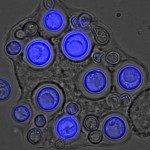Link to Pubmed [PMID] – 30139746
Link to DOI – 10.1074/jbc.RA117.001476
J. Biol. Chem. 2018 10; 293(40): 15538-15555
Innate immunity in animals including humans encompasses the complement system, which is considered an important host defense mechanism against Aspergillus fumigatus, one of the most ubiquitous opportunistic human fungal pathogens. Previously, it has been shown that the alkaline protease Alp1p secreted from A. fumigatus mycelia degrades the complement components C3, C4, and C5. However, it remains unclear how the fungal spores (i.e. conidia) defend themselves against the activities of the complement system immediately after inhalation into the lung. Here, we show that A. fumigatus conidia contain a metalloprotease Mep1p, which is released upon conidial contact with collagen and inactivates all three complement pathways. In particular, Mep1p efficiently inactivated the major complement components C3, C4, and C5 and their activation products (C3a, C4a, and C5a) as well as the pattern-recognition molecules MBL and ficolin-1, either by directly cleaving them or by cleaving them to a form that is further broken down by other proteases of the complement system. Moreover, incubation of Mep1p with human serum significantly inhibited the complement hemolytic activity and conidial opsonization by C3b and their subsequent phagocytosis by macrophages. Together, these results indicate that Mep1p associated with and released from A. fumigatus conidia likely facilitates early immune evasion by disarming the complement defense in the human host.


